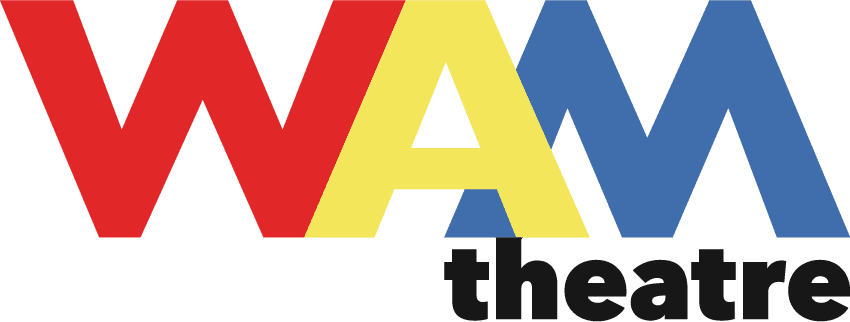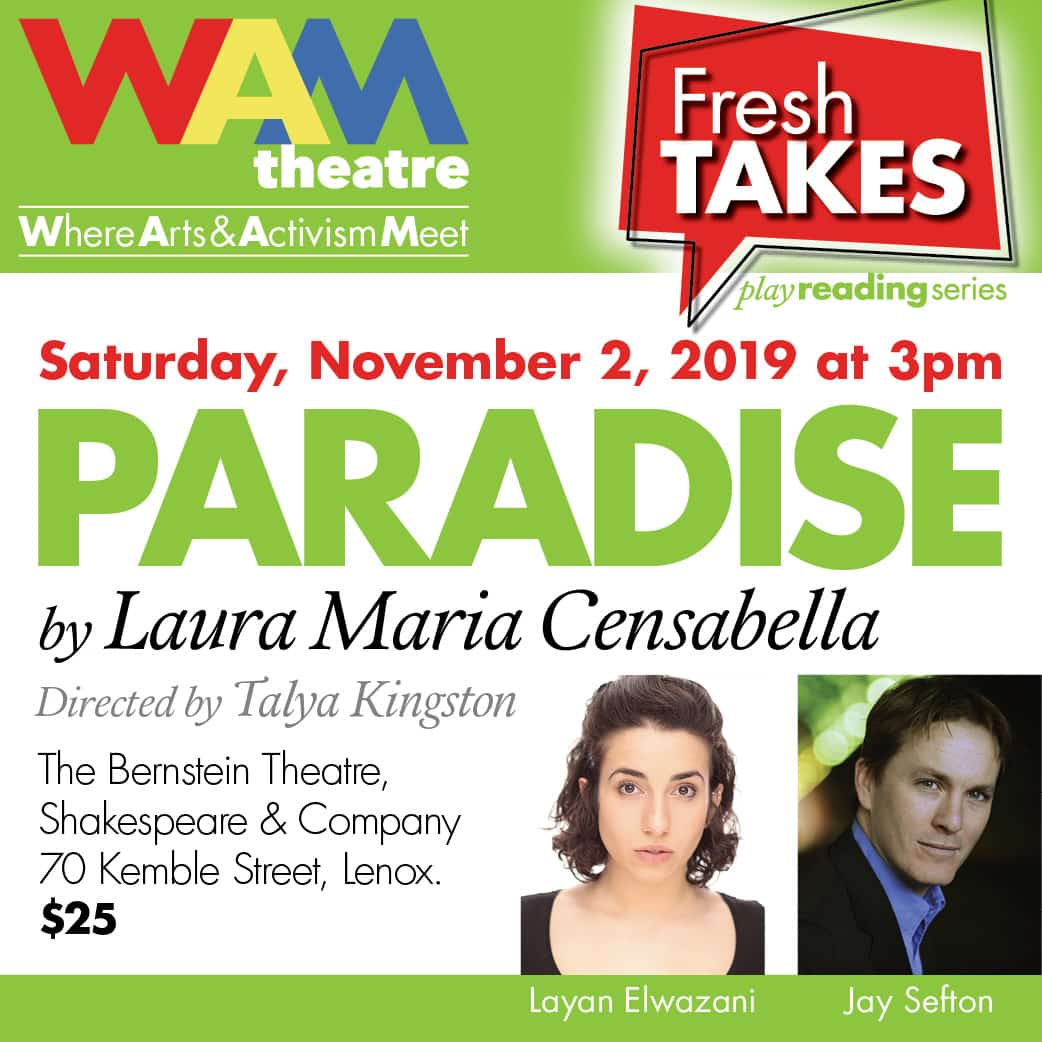
[button link=”https://www.wamtheatre.com/paradise/” newwindow=”yes”] Read More[/button] [button link=”https://crm.bloomerang.co/HostedDonation?ApiKey=pub_293457d8-c082-11e6-bb7f-024e165d44b3&WidgetId=192512″ newwindow=”yes”] Buy Tickets[/button]
PARADISE playwright Laura Maria Censabella (above right) in conversation with director Talya Kingston (above left).
Tell us about your play PARADISE.
PARADISE is an Ensemble Studio Theatre/Alfred P. Sloan Science Foundation commission. At the center of the play is an experiment about teenagers and first love conducted in a failing Bronx high school. It’s about the intoxication of discovering something in science that is utterly original. The experiment happens to be led jointly by a devout Muslim teenage girl, Yasmeen, who is brimming with life but has a secret that she can’t handle alone; and her jaded, burnt-out and formerly Evangelical science teacher, Dr. Royston. I’m interested in how we talk to one another over sometimes great divides.
What inspired you to write about this?
I was browsing the internet for another science topic and I came across a little article about an experiment related to romantic love and brain science conducted at the University of Padua. It fascinated me—I didn’t know that you could study love. And that little article led me to more and more articles about the science of love. And as I continued my research, I passionately wanted to know, like Dr. Royston in my play, what science could tell me about love that might rival the insights of all the greatest love poets. Like anyone, I have burning questions about love. Why does love die? Can we do anything to make love last? Does most romantic love (that doesn’t turn into indifference or hate) turn into companionship, and is that such a bad thing?
Another important inspiration for me were the young women of diverse backgrounds I taught in the New York City public schools for nine years as an artist-in-residence. Some of their personal stories of grace in the midst of chaotic circumstances coalesced into my character of Yasmeen.
And perhaps a less direct inspiration: my grandmother and grandfather both ran away from impending arranged marriages in Northern Italy when they were teenagers. I asked my grandmother to tell me the story of their courtship over and over again as I grew up.
The play deals with a young Muslim female science student, that alone piqued my interest in putting it on the WAM stage. It is rare to see a teenager in a hijab center stage as the protagonist in her own story.
Yes, that was important to me, that the teenage girl drive her own narrative. I wanted to get inside the experience of being devout and connected to one’s community–the joy in it as well as the pain of trying to reconcile two compelling but competing cultural traditions.

I was wondering about any research you embarked on in writing this play, both into Yasmeen’s cultural and religious background and into the scientific research that is referenced.
Okay, this may be a little more than you asked for but here goes!
When it came to the character of Yasmeen, I worked very hard to get the details “right,” bearing in mind that no one character can represent an entire community. I have strong ties with and a love for Arab culture. I am half Sicilian-American. Sicily has deep cultural, genetic and historical roots in North Africa as the Arabs ruled Sicily for almost 200 years. Our music, food and many of our social mores derive from Arab culture. A market in Palermo looks more like an Arab souk than it does an Italian market in Florence.
Additionally, in college and after, I was in a long-term relationship with a fellow student who was of Lebanese descent. His family became my second family and I met many of his relatives from Lebanon and other Arab countries. I also learned about the food, language, politics, etc. through them. And as I mentioned above, I taught in the public schools. I taught many girls like Yasmeen who were facing the dilemma she faces: how do you navigate between two cultures with often opposing agendas. It wasn’t hard to create a composite of my students in the character of Yasmeen.
The book All American Yemeni Girls by Loukia K. Sarroub was particularly helpful for the details of Yemeni-American working-class life, and the particular challenges Yemeni-American girls face in the public schools, as well as the strengths they derive from the experience. I also studied as much about the Muslim religion as I could in the several years it took me to write the play, mostly through reading the Quran and books about the religion, but also through asking questions.
When it came time to more deeply understand the specifics of Yasmeen’s emotional life, I interviewed many women of Muslim and/or Arab descent. They were remarkably candid in telling me their stories after people in their communities, whom I took the time to get to know, introduced me to them. Because I am coming at the character of Yasmeen from an outsider’s perspective, I know what non-Muslim Americans don’t know and what they are curious about, and I felt I could represent that curiosity through Dr. Royston in this play.
Finally, in the long developmental process for this play (four workshops around the country), I was often lucky enough to have devoted and excited Muslim-American actresses and assistant directors who could point out even minor errors in the script so that every line was vetted by numerous women. I am grateful for the gifts of their knowledge, humor and insight.
As for the science: I spent two years researching the science of love by reading many books and scientific experiments; listening to podcasts; watching videos; and attending regular seminars at the New York Academy of Sciences. I also studied other areas such as brain science, behavioral economics, fruit flies, animal mating, cheating in science, etc. I always knew that I wanted the science of my play to serve as a metaphor for what was happening between the characters emotionally. But since I only had a vague idea of what my story was going to be when I began, I had to learn more science than I would need.
It was also important to learn about the daily life of an academic scientist and I am grateful to the scientists the Sloan Foundation connected me with late in the process at Columbia University, scientists who understood the imperatives of storytelling, particularly Stuart Firestein, former chair of Biology there who used to be a theatre director. I also found Dr. Aliza Holtz at Touro College who connected me to my most extraordinary interview: a young Hasidic woman, Rachel Gutnik, who told me her remarkable life story and proved that the dilemma Yasmeen faces in this play is not unique to her culture or faith.
Another thing that fascinated me about the play is the theme of mentorship and teaching. The implied power dynamics in the teacher/student relationship and the possibilities of flawed mentorship. I was wondering if you have any experience of either flawed mentorship or disrupted student/teacher power dynamics that you were drawing from in writing PARADISE.
I had read a blog post online about a public high school teacher who was heartbroken when his star student told him about her parents’ expectations for her. He thought he could “save” her even though he completely misunderstood her. I wanted to confront our judgments about one another’s cultures and how we try to impose ourselves on one another. A book that I read in college which has become seminal to my world view is Chinua Achebe’s Things Fall Apart. I believe some of those themes have entered PARADISE.
How have audiences in different places responded to PARADISE?
The reaction has been remarkably the same everywhere. PARADISE is a story of two people who are at breaking points in their lives—who have painful struggles like all of us–but who, for at least a brief period of time, seek to create a paradise of shared work and laughter. Audiences enter the experience and seem transformed by it.
[button link=”https://www.wamtheatre.com/paradise/” newwindow=”yes”] Read More[/button] [button link=”https://crm.bloomerang.co/HostedDonation?ApiKey=pub_293457d8-c082-11e6-bb7f-024e165d44b3&WidgetId=192512″ newwindow=”yes”] Buy Tickets[/button]

